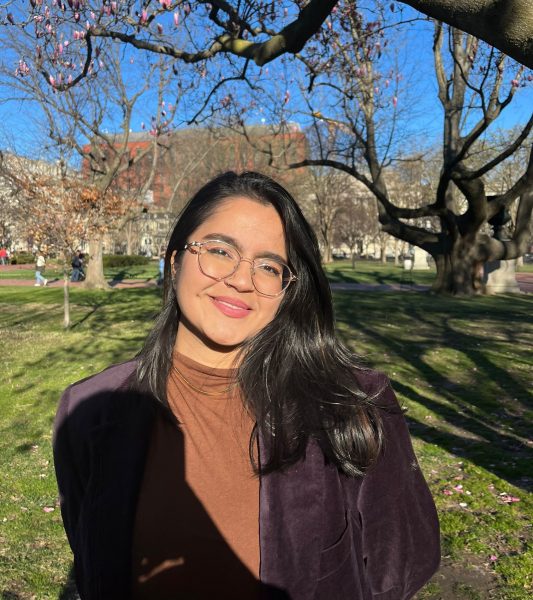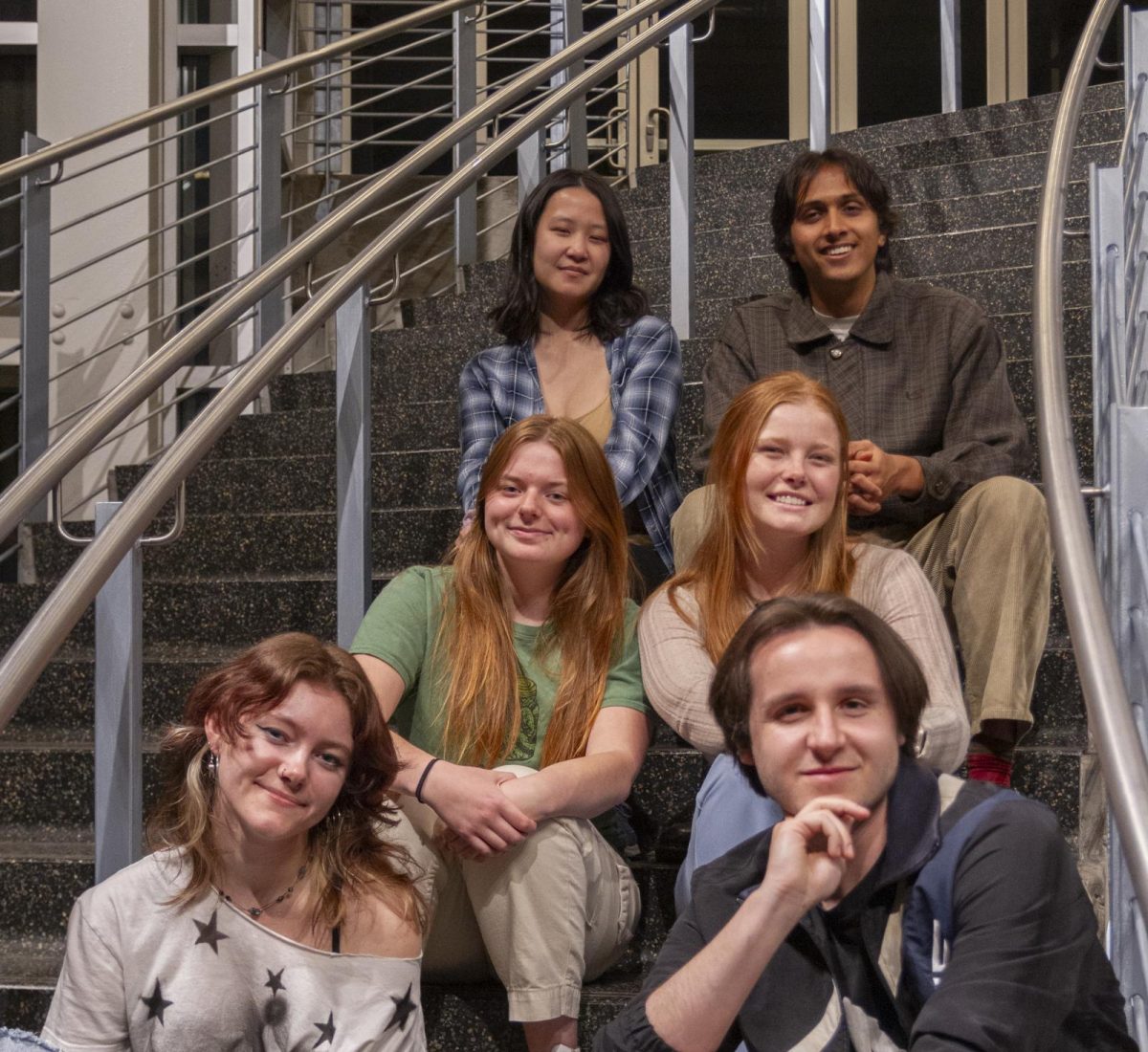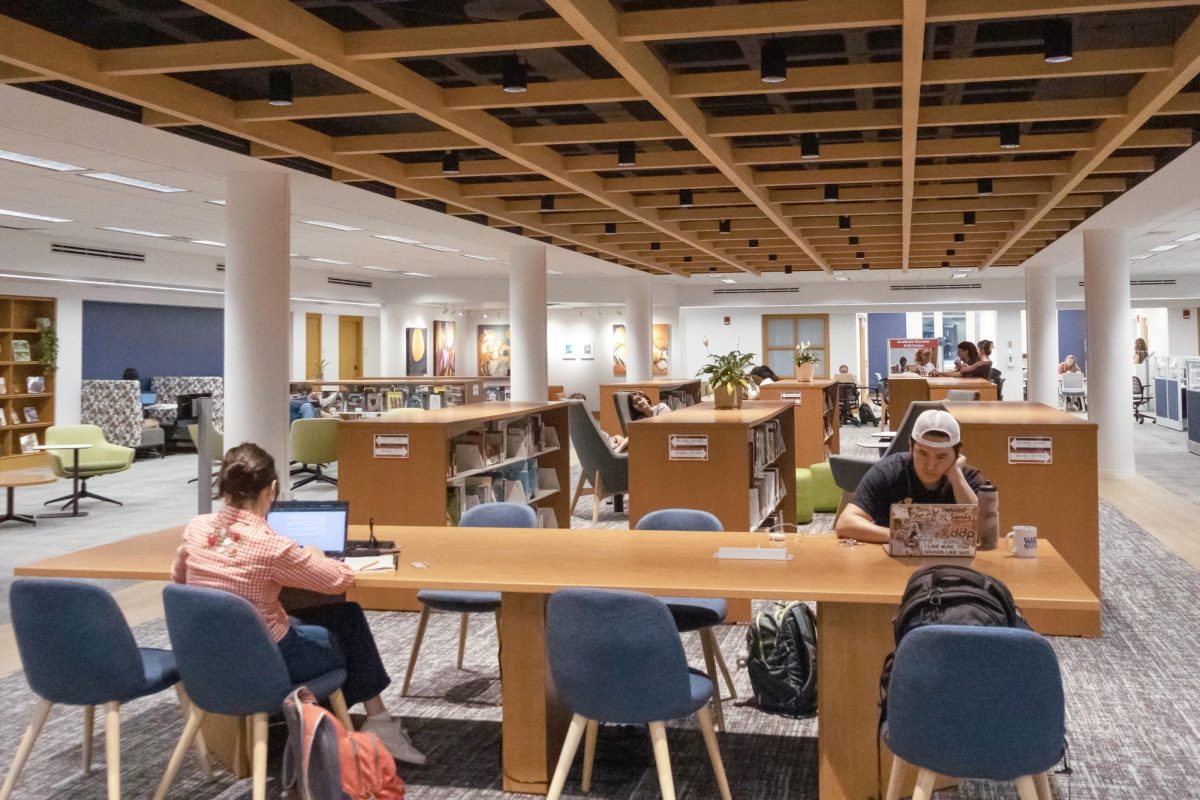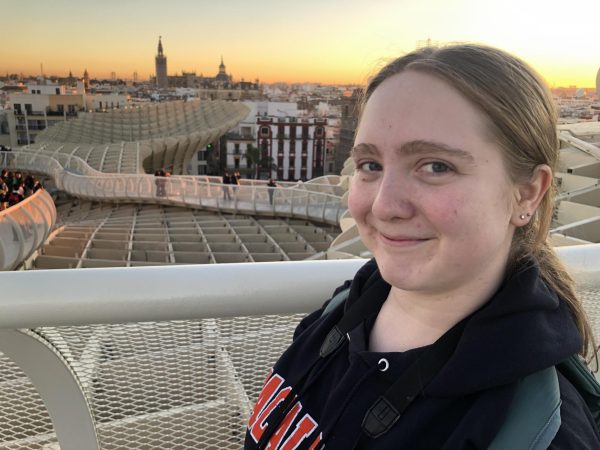In accordance with tradition, we sat down with The Mac Weekly’s graduating seniors, both those still on staff and those who parted prematurely, to hear about their time working for the paper and their experiences at Macalester. The Mac Weekly would like to note that Kamini Ramakrishna and Dipakshi Sarma did their individual interviews after the larger group. The following interviews have been edited for clarity and length.
The Mac Weekly (TMW): Why did you join The Mac Weekly and what made you stay?
Kamini Ramakrishna (KR): I joined Mac Weekly my second semester of freshman year when everything was on Zoom, and I was really wanting to join extracurriculars. There was a virtual Org Fair. I think I joined a Zoom meeting—either a general one or the news one. [After that,] I ended up going to news meetings. Then I ended up writing after a few of those meetings. My first article was about voting because the [2020 national] election was happening. So those [first] articles were really fun. Then I met Estelle [Timar-Wilcox ’22], our queen, that was freshman year. And then, in the fall, when I came back to sophomore year, everything was normal. And things were in person. I was like, ‘hey, okay, let’s do this thing’. And so I was emailing Estelle. I remember, I could not find the room at first. I was, like, ‘Where the hell is this place? I’m in the laundry room. Where are you?’ And then I found it. And then I remember opening the doors to many people, I was so overwhelmed. I found Estelle when she took me in like, made me feel so welcome in the giant space. That’s what made me stay was just how welcoming they all were to me.
Maddie Heinz (MH): When I was a sophomore in college, I was like, I need to be a journalist. That needs to be my career path and Mac doesn’t have a journalism major, and media and cultural studies was not exactly what I was looking for. So on [Professor] Howard Sinker ’78’s recommendation, I joined the paper. And I guess I stayed because it was really fun. And I met a lot of close friends. […] It just seemed like something you stick with.
Emma Salomon (ES): I joined my sophomore year because [TMW was] at the org fair and I said, ‘That’s fun. I’m gonna put my name down’. And then I went in and Maddie was there. And I said, ‘What if we went to a couple of things together”. We wrote an article and it was hell. Hell, it was the worst MCSG I’ve ever seen. And I feel like that kind of like trauma bonds. If you have a really bad experience, which is kind of funny.

TMW: Do you all have a favorite memory or favorite memories from your time here?
KR: Doing everything as an EIC with Jonah [Wexler ’23], that was a good experience. Like, we clicked really well. We had a good time together buying snacks, just doing the internal logistics of the paper. We worked really well together. It really grew our friendship and solidified our relationship with one another.
Lucy Diaz (LD): The night that we wrote ‘the floor is for everyone’ on the ceiling was a good night because everyone was just kind of tired and everyone was on the floor, and then Lily [Denehy ’22] spelled Mandy [Week ’25]’s name wrong.
ES: I think passing out the Mock in the snow our sophomore year, my first semester on the paper. It was [so] high-energy and chaotic and fun. Also all the papers were really wet and it was really, really not how we should have been doing it.
Zak Yudhishthu (ZY): Two weeks ago when we finished before midnight.
MH: I will say [that] both weeks we’ve finished before midnight, the files have not been sent so maybe it’s a sign.
Rory Donaghy (RD): I would say my favorite moment on the paper was probably the second semester I was here. The semester before, I never really talked to anybody. I just kind of like came in the office, edited photos, and then fucked off without talking to people. And then that second semester, when we were doing the spring issue photos, I had this opportunity to actually talk to people, like [I talked] to the editors for the photos. And that was the first time I really felt the connection with the paper. So it’s just a really nice memory of [realizing] I’m not just some guy in this office. And that was a nice moment.
ES: You’re more than a JPEG!

TMW: What moment are you most proud of on the paper?
Dipakshi Sarma (DS): When Milkee [Bekele ’24] and I collaborated on Blackness Uncensored. A lot of it had started because when we came back from study abroad [in the] spring of 2023, we realized that it was the most racially and ethnically diverse boardroom we had seen in The Mac Weekly, and it matters a lot, because journalism and the news industry in general is really, really small in its diversities. There’s a lot of talk about DEI [but] it’s different [to say] ‘we practice inclusivity’ versus actually having that happen in the room. And at the same time, we were re-situating back in the US thinking a lot about our positionality and what we wanted the paper to do. Some of us [who were] formerly on the board [wanted] a social justice angle to the paper.
There are many definitions of what social justice looks like. We were so responsible and active during the uprisings and all the years that The Mac Weekly has existed before this, [but] there’s more potential. We started Blackness Uncensored, [where we were] able to talk to Black students on campus, [asking them] about what does Black excellence look like for you? What does success or joy look like for you? Because it’s so defined for marginalized folks that it is turning the head to say, ‘Well, actually, how do folks who are put into boxes, define it?’ We got to talk to so many great folks. And it created space for other Black students to say, ‘Do I belong in this paper? Do I belong in writing and journalism?’ And I can’t say that it created a long lasting impact. I can say that it created questions [such as] ‘who are we always interviewing and who’s not in the room and not being interviewed?’
Abby Bulger (AB): I’m most proud of, I don’t know if this counts because it’s an article I wrote, but I wrote an article about the Jim Demonie exhibit at the MIA, which [was] really special. My connection through The Mac Weekly got me to be able to speak to people [and see the exhibit] and write something. It was very nice and poignant, because [Demonie] had just passed away the year before. And then publishing it, I heard from so many people that knew him and worked at the media. Someone in the art department printed it out and hung it up. And it’s still hanging in the department. It was very nice. And that’s my favorite part of working for The Mac Weekly: in the arts especially, [you are] able to make connections in the community and actually feel like you’re a part of the Twin Cities, because Macalester can be very isolating in that way. I get forwarded emails: ‘this org is interested in having you cover something’, it’s like, well, yes, I’m doing something for you and that’s why you’re contacting me, but it’s still making connections and meeting people.
ZY: Basically anytime that we’ve had to publish a lot of stuff on really contentious issues on campus. And knowing that there would be some people who’d be upset about whatever we published. Thinking through complicated questions, but then, ultimately, feeling like we made [good] decisions over publishing.
TMW: Moving on to more goofy questions, is there anything left on your Macalester bucket list?
DS: I would like to find my way from OLRI to Humanities. Apparently, you can do that from within the buildings. I have failed. I have the worst capabilities for directions.
AB: I’ve never been in the astronomy tower or the greenhouse, and I’m mad about that.
MH: The thing I want to do is go in the pool. I’ve never been in the pool.
AB: [The pool is] kind of nice, I’m not going to lie.
ES: I’ve never been in the sauna.
RD: It’s amazing. Oh, God, something I need to do before I get out of here: I need to be granted access to the OLRI basement. It’s so scary. Plutonium, taxidermied animals, old computers, crazy shit.
TMW: If you could only eat one Trader Joe’s snack for the rest of time and no other food, what snack would you choose?
KR: OPM [Orange Peach Mango Juice]!
DS: Dark Chocolate Peanut Butter Cups. They’re better than Reese’s cups any day.
ZY: Espresso Beans.
MH: Super Sour Scandinavian Swimmers.
LD: Not-stale TJakis [Chili & Lime Flavored Rolled Corn Tortilla Chips].
RD: Honestly I’m going to have to go with Giant Peruvian Corn.
AB: Also TJakis.
TMW: What is your hottest Macalester take?
KR: Maybe this is mostly about our year, because we’re the COVID year, but I feel like Macalester students tend to be very cliquey. I guess my take about that is just, like, don’t be cliquey. I mean maybe I’m a hypocrite. I feel like as humans, we all have cliquey instincts sometimes, but I feel like that’s not a good way to be. You should be open to people and just different ways that people are.
DS: Instead of making more new buildings, let’s look into what buildings are not working for their students and faculty and staff. I’ll leave it at that.
MH: This is not a hot take but people need to stop talking about the Endowment without knowing what the Endowment is. It’s so annoying and it happens every year.
TMW: What will you miss about working for TMW?
KR: I do miss writing things that people read and writing powerful pieces and putting my words out there.
ZY: The chatter and the energy on a Wednesday night.
RD: I will definitely miss distracting people. That’s so fun. Like having a little conversation when you’re supposed to be laying out a page or something.
ES: When they’re supposed to be laying out a page.
LD: Rory has laid out a whole one page. He did last semester’s photo page. And that’s why there were four Audreys [Audrey Milk ’26] at one point. He was trying to make all of the photos the same size so he just copy and pasted a bunch of Audreys.
TMW: What do you hope TMW will look like in 10 years?
DS: I hope we’re able to do the incredible coverage that we were able to do for Line 3 or BLM, which were just two of the many big things that happened during my time here. And it happened because our doors were open to anyone from the community, letting them talk about their local reporting, what they were seeing. It was a lot of intentional work around [the fact that] some of us are journalists and have had more practice doing this. Others are literally on the ground. So matching those ideas so that we can have a voice that keeps getting more and more coherent.
RD: The Mac Weekly published exclusively on TikTok in 10 years.
ES: I do think social media and having a good, innovative and effective strategy.
LD: I’d like to have a better relationship with the Twin Cities newspapers and newspapers at other colleges in the area.
MH: I’d like to see them having a bit more fun just like with weird layouts and like being experimental and creating a different layout.
TMW: Do you have any advice or warnings for future TMW staff?
KR: If you are a person with a marginalized identity, like a person of color, it might seem hard to feel like you can insert yourself into these spaces. But I would say to do it anyway. Try your best to do it anyway. Odds are you will be welcomed and will be supported. But then it’s also possible that you won’t, which really sucks, but there will always be people who will support you and who will welcome you in.
ES: Love each other!
ZY: Don’t leave the last empty box of seltzer water.
RD: I think I actually did that one time.
LD: Don’t take a full course load for your EIC semester. Take three, or three and an independent study, or three and a gym class.
MH: I feel like there’s always going to be something big that defines the semester and it can be really stressful. But it can also be something to look forward to and be proud of how you handle it and stuff like that.
LD: It’s okay to tell people no. Not all article ideas are good article ideas. Yes, you want content, but you also want the content to be good.
DS: People come to journalism because of different reasons and for different outcomes. We might all have the same central goal of ‘we want to get this paper out every week and maybe have a few special editions.’ But being able to find people both in and outside the editorial team is helpful, because then you can talk about the things you’re noticing or ‘I have a really late night and I want to talk to someone about it. […] what do I want to contribute to this paper and what does this paper contribute to me?’ It’s always bi directional. If you’re feeling like you’re giving more to the paper than what it’s giving to you, it’s time to question how you’re feeling in the room, what you’re able to write, who’s supporting you. We all care deeply about this paper, most of the people who come here care a lot, and other people care about this paper. It’s good to always question ‘Where do I want the quality of my life to be? And where do I want the quality of this paper to be?’
*The Mac Weekly would like to also thank Amanda Wong and Milkee Bekele who dedicated time and effort to the paper during their years here at Macalester.












